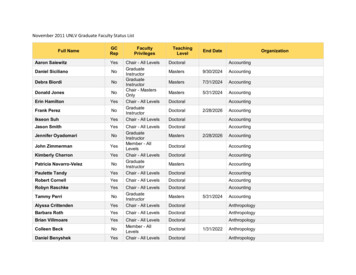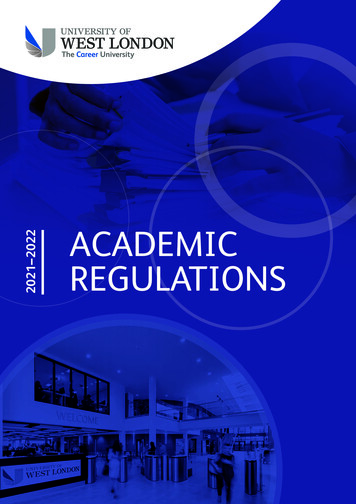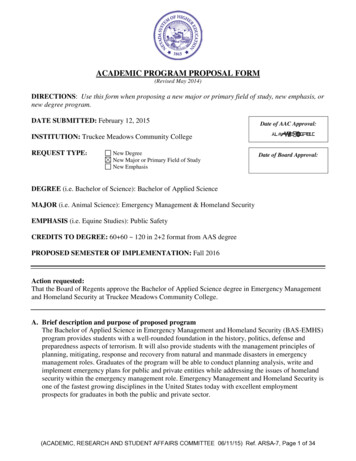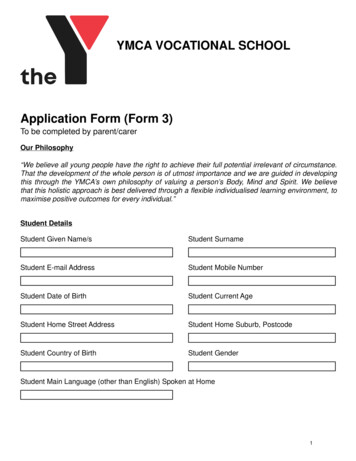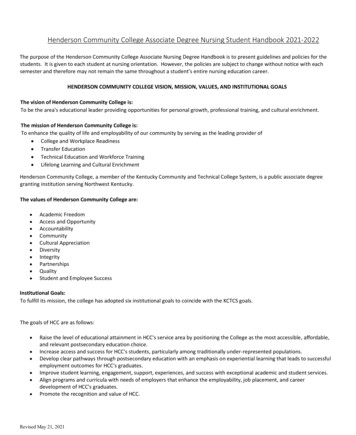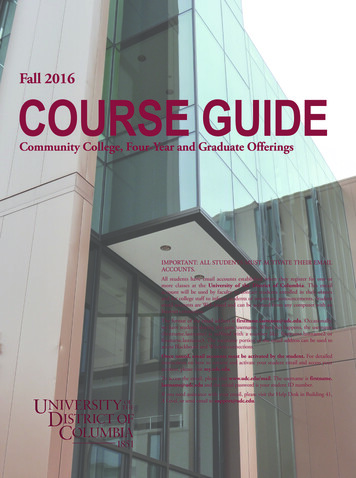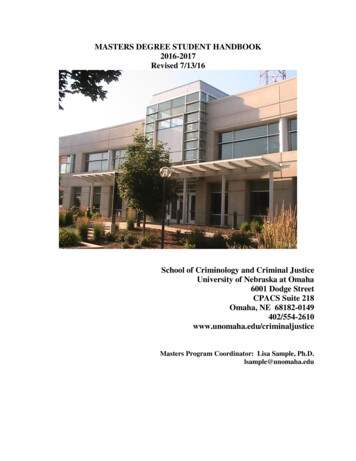
Transcription
MASTERS DEGREE STUDENT HANDBOOK2016-2017Revised 7/13/16School of Criminology and Criminal JusticeUniversity of Nebraska at Omaha6001 Dodge StreetCPACS Suite 218Omaha, NE iceMasters Program Coordinator: Lisa Sample, Ph.D.lsample@unomaha.edu
TABLE OF CONTENTSOVERVIEW OF THE PROGRAMS . 3Masters of Science Program: . 3Masters of Arts Program: . 3Certificate in Managing Adult and Juvenile Populations . 4ADMISSION REQUIREMENTS . 5STUDENT ASSISTANTSHIPS . 6ACADEMIC PROBATION, DISMISSAL, AND REINSTATEMENT POLICIES . 6GRADE APPEALS PROCESS . 10PROGRAM STRUCTURE . 12MASTERS STUDENT ADVISOR . 12PROGRAM OF STUDIES FOR THE MS, MA, and DUAL MSW/MS DEGREES . 13Program of Studies for the Masters of Science:. 13Independent Study and Internships . 15The Comprehensive Exam . 16The Capstone Course (CJ8970) . 16Program of Studies for the Masters of Arts: . 16Summary of Thesis Forms to be Completed and Submitted to the Masters ProgramCoordinator (MPC) and Graduate Studies . 18Change in Degree Program . 18Program of Studies for the Dual Masters of Social Work and Masters of Science degree: . 18STUDENT RESPONSIBILITIES . 23BASIC EXPECTATIONS FOR GRADUATE STUDENTS . 24IMPORTANT DATES . 25TENTATIVE SCHEDULE OF GRADUATE COURSES: 2015-2016 . 25FACULTY IN THE SCHOOL OF CRIMINOLOGY AND CRIMINAL JUSTICE. 28FREQUENTLY ASKED QUESTIONS AND ANSWERS . 30CAREERS WITH A CRIMINOLOGY DEGREE . 34CONTACT INFORMATION FOR QUESTIONS ABOUT YOUR GRADUATE DEGREE . 36FORMS TO COMPLETE YOUR MASTERS DEGREE . 37Application for Graduation . 37Proposed Thesis Advisor Form . 38Change in Plan of Study . 39Proposed Supervisory Committee Form . 40Thesis/Thesis-Equivalent Proposal Approval Form. 41Report on Completion of Degree Form . 42Revised 7/13/16
OVERVIEW OF THE PROGRAMSThe School of Criminology and Criminal Justice of the University of Nebraska at Omahaoffers two types of Masters degree programs and a Certificate in Managing Adult and JuvenilePopulations.Masters of Science Program:The Masters of Science (MS) degree is a terminal non-thesis degree designed to meet the needs ofprofessional practitioners in the field of criminal justice. To complete the MS degree, studentsmust complete a comprehensive exam or the Capstone course, in which students will conduct anindependent research project and write a report similar to those written in agencies and CriminalJustice organizations.The MS program requires that the student successfully complete 36 credit hours. NOTE: The MSdegree can be completed entirely by taking classes on-line, on campus, or a combination of bothon-line and on campus formats.Required Courses (12 credit hours)Elective CJ Courses (9 credit hours)Diversity course (3 credit hours)Open Elective Courses (12 credit hours)(The Cognate is 12 credit hours if comprehensive exam is taken or 9 credit hours the 3 credithour Capstone Course).Masters of Arts Program:The Masters of Arts (MA) degree is a non-terminal degree designed to emphasize researchactivity and independent inquiry. This degree is recommended for those students seeking aninterim degree prior to pursuing a doctoral degree. To complete the MA degree, students mustwrite and orally defend a thesis. The thesis is an independent research project and an academicexercise that is written to the standards of the faculty members on the thesis committee. A thesisrequires a committee of three faculty members and typically takes two semesters to complete.The MA program requires that the student successfully complete 30 credit hours.Required Courses (12 credit hours)Elective CJ Courses (9 credit hours)Diversity Course (3 credit hours)Thesis (6 credit hours)3
Certificate in Managing Adult and Juvenile PopulationsWe are proud to announce a new graduate level certificate program in Managing Adultand Juvenile Populations. This certificate is intended to address the educational needs of localand state criminal, juvenile, and social service agency personnel. It is a 15 credit hour programthat can be completed entirely on line and in conjunction with a Masters in Social Work (MSW),Masters of Science in Criminology and Criminal Justice (MS), or the dual MSW/MS degree.Required Courses: 15 Credit HoursSOWK 8886, Special TopicsSOWK 8686, Medical and Psychosocial Aspects of Alcohol/Drub Use and AddictionCRCJ 8080, Juvenile Justice SeminarCRCJ 8888, Risk/Needs Assessment ToolsCRCJ 8190, Independent Study (as assigned by instructor) OR any CRCJ electiveAdmission Criteria:Bachelors Degree3.0 GPAPersonal Statement no longer than 2 pages explaining interest in certificate programAdmission DeadlinesJan. 5, 2015 for Spring AdmissionMay 1, 2015 for Summer AdmissionJuly 15, 2015 for Fall AdmissionProgram of Studies for the Dual Masters of Social Work and Masters of Science degree:MSW and Master of Science in Criminology and Criminal Justice dual degree programIn order to help criminal justice professionals better serve the people with whom they work, andfor social workers to better understand criminal populations, the UNO Grace Abbott School ofSocial Work and the School of Criminology and Criminal Justice offer a dual master’s degreeprogram in which students can simultaneously obtain a Master’s in Social Work (MSW) and aMaster’s of Science in Criminology and Criminal Justice (MSCRCJ). A dual MSW/MSCRCJhelps respond to the needs of the community by providing specialized training in working withdelinquent and criminal populations across the continuum of care through diversion tocorrections to re-entry programs. There is much overlap in the clientele social workers andcriminal justice professionals serve. Correctional officers, probation/parole officers, and lawenforcement professionals are often placed in positions of addressing and counseling delinquentsand criminals with multiple social maladies to manage. Moreover, social work professionals inschools, private practices, and in the capacity of health and human services agencies often work4
with delinquent and/or criminal populations. The dual degree provides highly qualifiedpersonnel trained to work in schools, health and human service agencies, criminal justiceagencies, and nonprofit organizations. For degree requirements see page 19.* Note: Students have 10 years to complete their degree or certificate programs, but if they do notenroll in classes for more than 4 years consecutively, they will have to reapply to the programbefore taking classes again.ADMISSION REQUIREMENTSAdmission to the program is governed by the requirements specified by the University ofNebraska at Omaha’s Graduate College. Students have ten (10) years from admission to completeprogram requirements. In addition to the basic requirements established by the Graduate College,the School of Criminology and Criminal Justice requires the following:Unconditional Admission:1. Possession of a bachelor’s degree from a regionally accredited institution.2. Student has a 3.00 GPA (Average of B) overall in the undergraduate work.3. At least 12 credit hours of Criminal Justice courses or related courses that meet therequirements of the current School undergraduate curriculum, including a basic statisticscourse, a research methods course, and introductory Criminal Justice course, and acriminology course.* Note: Graduate Record Examination (GRE) scores are required for students to be considered for admission intoMasters of Arts Program in Criminology and Criminal Justice. Scores from either the former GRE examination orthe revised GRE examination will be accepted. For the former GRE, a combined score of at least 850 on the verbaland quantitative portions is required. For the revised GRE, a combined score of at least 250 on the verbal andquantitative portions is required. Students with a combined GRE score of less than 850 on the former GRE and acombined score of less than 250 on the revised GRE may be considered if they demonstrate exceptional academicpotential based on other admissions criteria. For additional information on the GRE, please visit their website athttp://www.gre.org. Also, UNO Graduate Studies language proficiency score has been increased from a 500 to a550 effective summer 2017.Provisional Admission:1. Student must have a bachelor’s degree from a regionally accredited institution (if theinstitution is non-accredited, 12 credit hours of graduate course work at UNO must besuccessfully completed before the student is eligible for unconditional admission).2. Has not completed all of the undergraduate prerequisite course requirements forunconditional admission to graduate study.3. Student has no less than a 2.75 overall GPA for the last two years of undergraduate workand not less than a 2.75 GPA in the undergraduate major.4. Students admitted provisionally can enroll in classes just as other students, except they5
have the provision that they must earn Bs or better in their first 12 hours of study.Note: Applicants must submit information required by the Graduate Studies and complete theapplication on-line. Applicants must also submit 2 letters of recommendation, and a letter ofintent/personal statement no more than 4 pages discussing reasons for pursuing a graduatedegree, interests in the field, and career goals for the future.Below are also some links that you might find helpful in obtaining general graduate studentinformation.Graduate Studies - http://www.unomaha.edu/graduate/Application- oradmission.phpPrograms - ries of Admission ion categories.php?t pProspective Student Information - tion & Fees - ips - nancial Aid - http://financialaid.unomaha.edu/Frequently Asked Questions - http://www.unomaha.edu/graduate/admission faq.phpSTUDENT ASSISTANTSHIPSThe School of Criminology and Criminal Justice sponsors a small number of graduateassistantships for MA students. A graduate assistantship provides an opportunity to pursuegraduate studies while working in an academic setting. An assistantship consists of tuitionremission plus a stipend of approximately 12,000 for the academic year. Students who receiveassistantships are expected to work as a teaching assistant and/or research assistant for a facultymember for 20 hours/week during the academic year.To be eligible for a graduate assistantship, a student must be enrolled in the MA programfor at least 9 credit hours per term (i.e., fall, spring) and have a strong interest in pursuingdoctoral level studies. To be considered for a graduate assistantship, applicants must apply to theMA program for the coming fall semester by February 1st of that year and indicate in theirpersonal statement their desire to be considered for an assistantship. The application materialssubmitted for entrance to the MA program will serve as the basis for determining if anassistantship will be awarded: personal statement, undergraduate GPA, GRE scores, and lettersof recommendation.ACADEMIC PROBATION, DISMISSAL, AND REINSTATEMENT POLICIESA "B" (3.0 on a 4.0 scale) average must be maintained in all graduate work taken as part of thedegree or certificate program.6
1. Automatic DismissalGraduate students are expected to do work of high caliber. Failure to do so will result indismissal. In particular, the following will result in automatic dismissal from the degreeor certificate program:a. Receiving a grade of "C-" (1.67 on a 4.0 scale) or below in any course taken in thestudent's major field of study or in any course included in the plan of study orprogram of study. A grade of "U" or "Fail" in any graduate course taken by agraduate student shall be treated the same as for a grade of "C-" or below andshall result in automatic dismissal from the Graduate Studies College.b. Departments/Schools may have additional and more stringent criteria forevaluating a student's performance and progress and may demand a higher levelof performance than that demanded by the Graduate College. The School ofCriminology and Criminal Justice requires that all Masters students receive agrade of “C” or higher in any course taken at the graduate level, and all Ph.D.students must receive a grade of “B-“or higher in any course taken to remainstudents in good standing. The School of Criminology and Criminal Justice may,under some circumstances, recommend dismissal of a student from a graduateprogram even though quality of work standards have been maintained. Groundsfor dismissal could include, but are not limited to:i.ii.iii.Failure to be accepted by an appropriate thesis or dissertation adviserwithin stipulated time limitations;Failure to make timely progress toward the degree or certificate; andFailure to perform in course work, qualifying examination or research atan acceptable level in the respective department/school or program unit.c. The Plan of Study and Grades That Result in Automatic DismissalGrades (e.g., grade of "C" or below for Masters students and “B-“for Doctoralstudents, "U”, "Fail") may not be applied to a graduate plan of study.d. Students dismissed from a Graduate Program who then re-apply as Non-degreeStudents will be placed on stop enrollment for the department/school from whichthey were dismissed unless they request and receive permission in accordancewith departmental/school graduate program policy to enroll as a non-degreestudent in that program.2. Probation or DismissalA department/school will recommend that the Dean for Graduate Studies either dismiss,7
or place on probation with conditions for reinstatement as a student in good standing, inthe following cases:a. A Grade of "C" (2.33 on a 4.0 scale) or below in any course involved in the first12 hours of graduate study for provisionally admitted students;b. Receiving at least nine hours of graduate credit with the grade of "C" (2.33 on a4.0 scale) or below in any courses taken in the student's major field of study or inany courses included in the plan of study for master's or specialist's degrees orgraduate certificates, regardless of the average;c. Receiving at least six hours of graduate credit with the grade of "C" (2.33 on a 4.0scale) or below in any courses taken in the student's major field of study or in anycourses included in the program of study for doctoral degrees, regardless of theaverage;d. Failure to maintain a "B" (3.0 on a 4.0 scale) average in all graduate work takenas part of the degree or certificate program.3. Additional RequirementsSome departments/schools apply additional criteria of satisfactory performance beyondthe requirements of the Graduate College. A copy of the department's/school's policyshould be on file in the Graduate Studies Office and a copy distributed to every graduatestudent enrolled in the program.a. In the School of Criminology and Criminal Justice, Doctoral students mustreceive a “B-“ or better in all graduate courses taken in order to have those hoursapplied to their plan of study.4. Monitoringa. The Masters and Doctoral Program Coordinators, as well as students’ SupervisoryCommittees in their respective departments/schools shall be responsible formonitoring quality of work in degree, certificate and unclassified programs andfor recommending action.i.The Graduate Studies Office will send a report to each department/schoolat the start of each semester with the names of students who have receivedat least nine hours of graduate credit with a grade of "C" (2.33 on a 4.0scale) or below as of the end of the previous semester.ii. The Graduate Studies Office will send a report to each department/schoolat the start of each semester with the names of doctoral students who havereceived at least six hours of graduate credit with a grade of "C " (2.33 ona 4.0 scale) or below as of the end of the previous semester.8
b. The Graduate Studies Office shall be responsible for monitoring quality of workin non-degree programs.c. The Dean for Graduate Studies will make the final decision and notify graduatestudents of their status.5. Student Responsibilitiesa. Students must be aware of the Quality of Work Standards of the GraduateCollege, as well as additional criteria of satisfactory performance in theirrespective department/school programs.b. It is the student's responsibility to know when his or her previous course work hasfailed to meet those standards.c. Students who are attending classes are still subject to dismissal if theirdepartment/school recommends that action based on its review of their previousperformance.6. Policy on Petitioning for Reinstatement into a Graduate Program:The process for petitioning and evaluating petitions for reinstatement into a graduateprogram is the responsibility of each department/school Graduate Program Committee.For the School of Criminology and Criminal Justice, the reinstatement policy is asfollows:a. Once students have been dismissed from the program, they must wait oneacademic term to request reinstatement.b. At the end of the term, students may write a letter to the Masters or DoctoralProgram Coordinator requesting reinstatement. The letter must include 1) anexplanation for the previous poor academic performance, 2) a discussion of whatchanges have been made in students’ lives to ensure satisfactory academicperformance in the future, and 3) a plan for course selection and study habits thatwill ensure academic success in the future.c. Upon receipt of the letter requesting reinstatement from a Masters student, theMasters and Doctoral Program Coordinators, as well as the Director of the Schoolof Criminology and Criminal Justice, will jointly decide if the student should bereinstated. In the case of doctoral students, the full committee of graduate facultywill consider and decide on reinstatement.7. Fairness of Decision9
Students should feel free to contact the Dean of Graduate Studies with anyquestions or concerns for the fairness of this process.GRADE APPEALS PROCESSOverviewThis document outlines the policy and procedures for a graduate student to appeal a gradereceived in a graduate course offered within the School of Criminology and Criminal Justice(SCCJ). The policy seeks to articulate and protect both the rights of students to fair and impartialevaluations of their academic performance and the rights and responsibilities of faculty whoprovide such evaluations. A course grade assigned consistent with University policy may only bechanged by the instructor. University administrators may direct a grade to be changed only whenit can be establish through the appeals process that the instructor assigned the course grade in anarbitrary or capricious manner. An arbitrary or capricious action is one taken without regard forthe facts or circumstances of the appeal; such an action would lack a basis for a reasonable,informed, and honest person to arrive at the same conclusion.Grade Appeal Procedures1)First, the student should arrange a meeting with the instructor to discuss the contestedgrade. The SCCJ encourages instructors and students to work together in order toinformally resolve disagreements regarding course grades. SCCJ recognizes, however,that informal resolution is not always possible nor is it always the best course of action.In cases where informal resolution cannot be achieved, the proceeding steps must befollowed. In short, an informal resolution is recommended as the first step.2)If the matter cannot be resolved with the instructor, the student has six weeks from thedate the grade was given to submit a written appeal to the Master’s Program Chair or theDoctoral Program Chair (hereafter simply referred to as Program Chair), depending onthe program in which the student is enrolled. The student will also be required to providea copy of his/her written appeal to the instructor of the course in question. To expeditethe process, electronically submitted appeals are encouraged. Upon submitting the appealto the Program Chair, the appeal will then be forwarded to an ad hoc committeecomprised of three randomly selected tenured faculty from the SCCJ. The Program Chairwill inform both the affected student and course instructor of the composition of theassembled ad hoc committee.Although a student has six weeks in which to file a written appeal, the SCCJ facultystrongly encourages the student to submit the appeal within three weeks from the date thegrade was given if the student would like to receive a decision in a timely manner. Thestudent should be mindful of the series of steps in the process; a student who takes longerto file an appeal will spend more time waiting for a resolution. The written appeal shouldcontain the student’s complete argument for why s/he is contesting the grade. In doing so,10
the student should do more than merely state that the grade was assigned arbitrarily orcapriciously; the student should provide supporting evidence for his/her argument. Inshort, the student is encouraged to submit a written appeal to the Program Chairand instructor within three weeks of the date a grade was given (if the matter cannotbe resolved informally).3)The instructor must provide a written response to the student’s argument that a coursegrade was assigned in an arbitrary or capricious manner. This response may be submittedvia email to the assembled ad hoc committee and Program Chair and must be done withinfifteen business days after receiving the student’s written appeal. Faculty may request anextension in the case of extraordinary circumstances. The faculty member will also emailtheir response to the student. In sum, the faculty member must provide a writtenresponse to the ad hoc committee, Program Chair and the student within 15business days of receiving the student’s written appeal.4)Once the ad hoc committee and Program Chair have both the student’s written appeal andthe instructor’s written response to the appeal, consideration will be given to the merit ofthe appeal. The ad hoc committee will have 10 business days to consider both sidesand will notify both parties via email about the committee’s decision and the basisfor their decision.5)If there is merit to the appeal, the ad hoc committee will recommend that theinstructor reconsider the grade issued. The instructor will have 10 business days todo so. The instructor will then communicate his/her decision via email to the student, thead hoc committee, and the Program Chair.6)If the student is not satisfied with the instructor’s decision regarding thereconsideration, s/he may submit a formal appeal to the Dean of Graduate Studiesfor further review of procedures. The SCCJ faculty recommends that this appeal besubmitted in a timely manner (e.g., within a week) in order for the Graduate StudiesCommittee to give it full consideration prior to a semester’s end. The student should alsobe advised that the Committee meets only during the spring and fall semesters; appealsreceived at the end of a semester may not, therefore, be resolved until the followingsemester. If the student decides to move the appeal beyond the School of Criminologyand Criminal Justice, the student must notify the Program Chair who will then notifythe Director of the School. The Director will then verify that all the School’s policiesand procedures were followed and that a resolution was not reached. The School’sDirector will then forward the materials amassed on to Graduate Studies, along witha letter outlining the appeal and the decisions reached within the School. The student andfaculty member will receive a copy of that letter for their files.7)If the affected student or faculty is dissatisfied with the process at any time the UNOOffice of Ombudsperson may be called upon for assistance. Information about the officeand its function may be found at http://www.unomaha.edu/ombuds.php#. To be clear,“Requests for the service of the Ombudsperson usually occur when the normal11
bureaucratic process has failed to function properly and, therefore causes undue hardshipto one or more members of the UNO community.”PROGRAM STRUCTUREAdministratively, the program leading to a Masters degree in Criminology and CriminalJustice is located in the School of Criminology and Criminal Justice, which is a unit of the Collegeof Public Affairs and Community Service. General supervision of the Master’s program is theresponsibility of the School of Criminology and Criminal Justice Graduate Program Committee,whose members are appointed by the UNO Dean of Graduate Studies and Research. The SchoolDirector recommends that the Master’s Program Coordinator serve as co-chair of this committee,along with the Doctoral Program Coordinator, to the Dean of Graduate Studies and Research.It is the responsibility of the Masters Program Coordinator to provide general supervisionof the master’s degree programs, including admission of students, implementation of policy, andgeneral administration of the degrees.MASTERS STUDENT ADVISORWhen a student is officially admitted to the MS or MA program, the Masters ProgramCoordinator assigns a faculty member to serve as the student’s academic advisor. Masters studentsare assigned to faculty members in Omaha only, so they have ready access to their advisors withouttraveling to Lincoln. Masters students should make contact via phone or email within a few weeksof the assignment in order to discuss course work selections. Prior to making contact with thestudent advisor, students should create their own plan of study.Plan of StudyStudents’ plans of study should take into consideration their career goals. Individual careergoals should drive the choice of courses taken and the degree pursued (MA or MS). Once careergoals are identified, students should review the graduate course catalog to decide which courseswould best address their needs. From a review of the course catalog, a plan of study can be created.After achieving a rough outline of a plan of study, students should contact their advisors. Advisorscan help students match courses to career goals, tell students when courses will be offered, andprovide advice on whether an MA or MS degree would best fit the student’s goals. In subsequentsemesters, it is up to students to decide if they require further assistance from their advisors onrevising their plans of study.NOTE: It is students’ responsibility to check their MAV LINK accounts and conduct a degreeaudit to determine unfulfilled requirements prior to contacting their advisors. This should be doneevery semester to ensure students are receiving the appropriate credit for courses taken and are ontrack to graduate. Students should inform their advisors and/or the Masters Program Coordinator12
of any discrepancies noted reporting MAV LINK as soon as possible so these can be resolvedthrough the Graduate Studies College.PROGRAM OF STUDIES FOR THE MS, MA, and DUAL MSW/MS DEGREESProgram of Studies for the Masters of Science:Required Courses (12 credit hours)8010 The Nature of Crime8020 Seminar in Administration of Justice8030 Criminal Justice Research, Theory and Methodology8950 Statistical Applications in Criminal JusticeElective Criminal Justice Courses (9 credit hours)Students will select 3 elective CJ courses at the 8000 level or higher, with adviser approval. If CJ8130 or CJ 9030 is
that can be completed entirely on line and in conjunction with a Masters in Social Work (MSW), Masters of Science in Criminology and Criminal Justice (MS), or the dual MSW/MS degree. Required Courses: 15 Credit Hours SOWK 8886, Special Topics SOWK 8686, Medical and Psychosocial Aspects of Alcohol/Drub Use and Addiction
